#plot and pacing
Explore tagged Tumblr posts
Text
Fortunately, Unfortunately
I recently shared my first 30 pages with my writing mentor, and now I’m telling you all the advice she gave me (this is part 4! Part 1 is here, 2 here, and 3 here.)
One big misstep of how my plot gets into motion at the beginning is what she called “a series of random events.” They were plot points that happened next to each other, but otherwise didn’t impact each other. They were dominoes spaced too far apart.
She wanted me to tighten up the plot so that from the very first moment, everything impacts everything else. From the first push, each domino falls in tandem.
The exercise she used to teach us when she was mentoring me as a kid was called “fortunately, unfortunately.” It’s made to help you answer how each plot point leads into the next. It looks like this:
Unfortunately, Character A gets a note from their estranged uncle inviting them to his mansion for the summer. (inciting incident)
Fortunately, they’re allowed to bring a friend with them!
Unfortunately, when they get there, the uncle screams that the friend is possessed.
Fortunately, they’re both allowed to stay anyway.
Unfortunately, that night, Character A catches their friend sleepwalking as they build an altar to some unknown god.
Etc. Etc.
From the very first domino (the inciting incident) in which the world pushes at the character, everything else falls in place afterwards. This allows you to maintain momentum throughout your novel, and hooks your reader from point to point.
Good luck!
#writing#creative writing#writers#screenwriting#writing community#writing inspiration#filmmaking#books#film#writing advice#fortunately unfortunately#plot and pacing
232 notes
·
View notes
Text
I think that one thing people fail to understand is that unsolicited literary criticism coming from an online stranger who is reading with no knowledge of what the authors intended goal is, is not going to be received the same as say: the authors beta reader or friends who know what the authors intended goal and has the sufficient knowledge and input to help the author reach that desired outcome.
"But I'm only trying to be helpful" How do I know you have the knowledge and literary skill for you to be able to actaully do that when we don't know each other and you are essentially a stranger to me? Are you applying this criticism based out of personal biased experience and desire to see the story or characterization be driven in another direction or tweaked, or do you know the author's intentions for the character? If the story is incomplete, are you basing your criticism of a character on the incomplete narration with only partial information available of them or are you building up a report until the story's completion? Did the author provide you with the information needed to make a fully informed criticism?
Have you discussed with the author what their plans are or are you assuming them based off the narration, especially if the narration is proven or implied to be unreliable or missing key points of the plot? Are you unbiased enough to help them reach their desired outcome for the characters and story regardless of your personal feelings towards the characters/antagonists and setting? Can you handle being told your specific input isn't wanted because you're a reader and/or have no written anything relating to their genre or topic? Do you understand and respect that the author's personal experiences might influence their writing and make it different than how you would have done it personally? Do you understand if an author only wants input from a specific demographic relating to their story?
If it's for fanfiction or other hobby media, are you holding a free hobby to a professional standard? Are you trying to give criticism because you feel like the author has produced 'subpar job performance' of their fic? Are you viewing their work as a personal intimate outlet or something that must conform with mass media? Are you applying rules and guidelines when the fic is shared for simple sharing sake? Is your criticism worded appropriately and focused on the parts where the author has requested input on rather than a general dismissal and or disapproval?
Have you put yourself in a place where you assumed you have the input needed for the story to evolve better, or have you asked what the author needs and what they're having trouble with? Can you handle having your criticism rejected if the author decides their story doesn't need the change and not take it as a personal offense against your character? Are you crossing that boundary because you think you are doing the author a favor? Are you trying to be helpful, or do you just want to be?
I think sometimes when people hear authors go 'please don't give me unsolicited writing advice or criticism' they automatically chalk it up to 'this author doesn't want ANY constructive feedback on their stuff at all' and not "i already have trusted individuals who will help me with my writing goals and- hey i don't know you like that, please stop acting so overly familiar with me'
#small rant brought to you by: listened to my younger sibling's friend be very upset today because an original story she wrote gets bashed#the story itself is fine maybe a little fast paced but overall she was happy with it's progress#and there is this one dude who keeps trying to tell her that her story needs to go another direction to 'make sense' and it changes the end#after she's repeatedly explained she's happy with the outcome and does not want to expand on that plot point any further#dude says she's 'unreceptive to criticism' no dude you're just being a dick#constructive criticism helps the AUTHOR reach THEIR intended goal#not steer the story in the direction a reader wants to see it go#sara shush#pls don't reblog with any 'but i take unsolicited criticism all the time' this isnt about you. your boundary is not other people's boundary
5K notes
·
View notes
Text
Let's talk about pacing.
Pacing is crucial to consider in plot development. It refers to the speed at which events unfold in your story.
It's important to vary the pacing to keep readers engaged. By effectively managing it throughout, you can maintain reader interest, build tension, and create an overall compelling narrative.
Fast-paced scenes: Use quick, action-packed scenes during moments of high tension, such as intense action sequences or pivotal plot points. Short sentences and rapid-fire dialogue can help create a sense of urgency and keep readers on the edge of their seats.
Slow-paced scenes: Slow down the pacing during moments of introspection, character development, or when you want to build atmosphere. Take the time to delve into emotions, descriptions, and inner thoughts to deepen the reader's connection to the characters and world.
Transitions: Smoothly transition between fast-paced and slow-paced scenes to maintain momentum while allowing readers time to catch their breath and process information. (See here for more on how to effectively implement transitions!)
Avoid prolonged lulls: While it's essential to have slower moments for character development and world-building, be cautious of prolonged lulls in the story where nothing significant happens. Keep the plot moving forward, even during quieter scenes, by introducing new information, conflicts, or character dynamics.
Balance: have a balance between fast-paced and slow-paced scenes throughout your narrative to create a dynamic reading experience. Too much action without sufficient downtime can exhaust readers, while an excessive number of slow scenes may lead to boredom.
More writing help on my blog! ❤
Previous | Next
#writeblr#writing#writing tips#writing resources#writing help#plot development#creative writing#pacing#deception-united
2K notes
·
View notes
Text
What To Do About Filler
I am deeply frustrated at the increasing usage of the concept of "filler" in writing, partly because how people are using it is completely separated from what it usually means, and partly because few people explain what they actually mean when a story lacks "filler."
So, in short, when this comes up, what people usually are talking about is:
A lack of subplots. Subplots are essential background to developing your story beyond the main action points. Subplots include romantic storylines, internal journeys (learning to deal with a trauma, for example), plots that are critical for secondary characters, etc.
No room to breathe (aka pacing). Keeping up the tension is a common piece of advice, but if every single scene is filled with tension, you're going to exhaust the reader (and yourself). Quieter moments allow characters to reflect, realize things (like feelings for each other), and give you space to establish worldbuilding and mood.
Rushed or missing character development. Giving your characters space to learn things about themselves, confess or realize feelings, and moments to make decisions and change are essential to a story. Defeating the big bad is important, but usually the inner strength to do so comes from the character changing over the course of the story.
I am losing the battle against using the word filler when you mean a story lacks other things. Other than shaking my fist at the youths, I suggest that if you get feedback about "filler," see if you can get specifics. Is it an issue with pacing? Character developments? Not enough description or worldbuilding? If a romance seemed rushed, at what points does the reader think there should be more interaction? Etc.
A note for fanfic writers: Your goals are often different from someone writing to publish, but hammering down what filler means can still help you as well. Narrowing down the point of your story ("in this drabble, these characters flirt without using words" or "sexy coffeeshop AU") and making sure to ask your beta readers if what you're writing fulfills that goal can help you figure out if your story is making the impact you want.
907 notes
·
View notes
Text

Gaslight, Gatekeep, Girl found dead in a hidden room.
[First] Prev <–-> Next
#poorly drawn mdzs#mdzs#lan xichen#jin guangyao#jiang cheng#wei wuxian#qin su#EDIT: Tumblr published an earlier draft with only half the notes I wrote so: late entry on my JGY thoughts.#Unlike the mystic powers of the stockmarket (what the OG meme is referring to) I think this situation calls for more active investigation.#qin su is such a deeply tragic character to me and I really wish we got a bit more from her.#Love everyone who sent me messages about her after the last time she appeared.#I think she needs a spin off of her being a transmigrator SO badly.#MDZS has so many interesting characters - but it sometimes fails to give them the proper room to really develop past a role in the plot.#That's just the consequence of writing a story like MDZS. Not every character in a book *needs* to have a rich inner life and backstory!#To do so would bog down the story and obliterate any notion of pacing. It's just not possible.#Jin Guangyao (nee Meng Yao) is unfortunately not free from this leeway rule. He is the culprit of this murder mystery plot#and thus NEEDS to encapsulate the themes of the book. And personally he's a 7 out of 10 at best on this front (in the AD).#MDZS is about rumours twisting reality and working towards truth. And about how people & situations are rarely ever black & white#JGY has his motivations. He's well written in regards to his actions making sense for his character.#What started as good traits (drive to succeed & improve his image) became twisted over time (do anything to maintain his image)#and it's a good parallel to WWX! He has the same arc (with different traits)! Bonus points for IGY in that regard.#but man....by the time we confront this guy for murder there's not a lot of grey morality. He's just...deep in the hole *he* dug.#There's a beautiful tragedy to it! More on JGY in later comics - this is getting pretty long already!
2K notes
·
View notes
Text
Anyone who’s been saying that Nick and Charlie are too sexually pure like “oh they’re teenage boys, they’d be having a lot of sex” has clearly never read the novella
#like before Heartstopper was even a thought in Alice’s mind#we knew that they had sex in a blanket fort in the living room#for the record#I think the pacing of that plot point is perfect#especially given Charlie’s mental health journey#and Nick’s coming out journey#and their ages#and the genuine care and respect they have for one another#not to rush into things before they’re both 100% ready#heartstopper#osemanverse#nick and charlie#nick x charlie#narlie#nick nelson#charlie spring#heartstopper tv#heartstopper season 2#heartstopper s2
2K notes
·
View notes
Text

MGSV sketch dump. The brainrot is thriving
#mgs#metal gear solid#mgsv#mgs5#mgsvtpp#I’ve let the brainrot simmer for a couple of days and dare I say I think I love this game#I mean there are things I hated but overall an absolute banger#I’ll definitely be replaying it#one thing I think the game would’ve benefitted from is taking more time for the ending#it was too abrupt#the additional higher difficulty missions could’ve been a mode#and those episodes could’ve been used to pace the ending#I also hesitate to recommend the game cuz it really benefits from the context of previous games#and that’s a lot of game#mgs5 also covers some very heavy topics#that hit very close to reality#I might have gotten more squeamish with time but some of those things were very difficult to process#one thing I think mgs does very well is it never settles for one side or one person being the absolute hero#in this plot they may be a relatively good person#but in the next they’re the villain#but it’s never static#and it u can’t get cozy with tropes#it’s not even grey morality it’s just human nature
325 notes
·
View notes
Text








Bellamy Blake in 4x03 'The Four horsemen'
#bellamyblakeedit#the100edit#bellarkeedit#bellaarke#the100daily#userleila#usertimlucy#bellarke#clarkegriffinedit#idk why i felt like doing this episode i really love season 4#even if most people don't#it's quieter#slow paced and focuses on the characters instead of just the plot thats why i love it#anyway it's awful to color this tho so sorry about that#my gifs
208 notes
·
View notes
Text


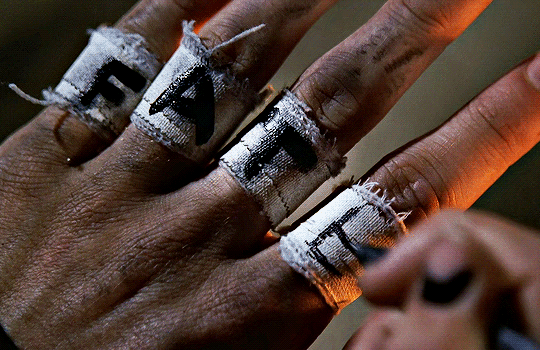



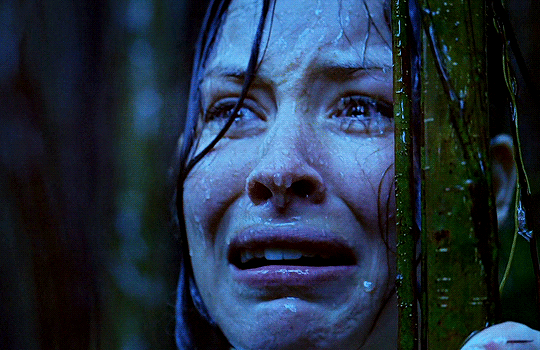



19 years ago today, Oceanic Flight 815 crashed.
#lost#lostedit#tvedit#lost spoilers#jack shephard#kate austen#charlie pace#shannon rutherford#john locke#james sawyer ford#nikolatexla#the best show in tv history premiered 19 years ago today#i'll always be insane about this show#it has the best pilot best characters best plot best opening scene best soundtrack etc etc#i lowkey wanna gif every episode of lost like this according to the date it aired
2K notes
·
View notes
Text






this is the point where Usagi's idealism tips the scales from practical to metaphysical. it's not just about loving thy enemy, it's about BEING thy enemy. an empathy so radical that you will give up your own life to merge with the rest of the universe and remember what it's like to breathe with a single set of lungs and feel the pulse of the lone common heart.
#sms watches cosmos#say what you will about the plot the pacing the characters and everything else#the philosophy pops off
167 notes
·
View notes
Text

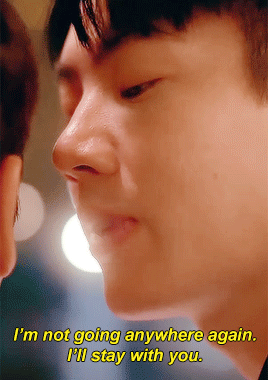




(っ˘з(˘⌣˘ ) ♡
#the trainee the series#the trainee series#the trainee ep12#janeryan#jane x ryan#offgun#off jumpol#gun atthaphan#gmmtv#thai bl#bl drama#bye bye the trainee!#all in all a show with good messages about life and a good cast#but also with terrible romance plots; a strange pacing and unreasonable character choices and developments#too bad#at least we know OG can do better
158 notes
·
View notes
Text
persona misogyny is so fucking wild. ignoring literally everything else about the entire rest of the games, every single s.link with a female character is like “entirely for having been born a woman i have had to work twice as hard for a fraction of the benefit. even now, i am stripped of my agency in a position i never wanted in the first place” and/or “i’m put on a pedestal by the people in my life because of my looks. men see me as an object to be conquered, women hate me for ‘stealing’ ‘their’ men. if i’m withdrawn i’m a bitch, if i’m friendly i’m easy. because of this, i’m alone” and/or “because of my personality or hobby or lack of cooking skills, i feel like i’m failing at femininity. if being a woman is something i can fail at, then where does that leave me? i’m scared at the loss of my identity and place in society”
like very consistently they present female characters with complex thoughts towards their place in society as women, femininity as a whole, and facing issues stemming from misogyny, and then the payoff is always “my problems were entirely my own fault. i wasn’t strong enough, i was a coward. but now, i’m gonna work hard to be exactly what society expects me to be (which is what i want to be)! i’m gonna do better at femininity (which is still something tangible i can fail at)! i’m going to try hard at making friends (which was my fault for not doing)! all my problems are solved through personal responsibility (that im totally culpable for), effort (which i previously was not putting in), or you, a man! i am Happy and Satisfied with this outcome, can i be Your woman?”
and like hello? why are we here. what the fuck are we doing. why do we keep doing this every single time. can we not do the constant lukewarm attempts at criticizing misogyny so you can jerk off to your own thoughtfulness, while ultimately reinforcing patriarchal systems and brushing off any deeper misogyny-bred issues as a lack of deference to one’s rightful place in society? like maybe don’t do that? for fucking once? just an idea
#i’d really need to rewatch slinks to give more indepth thoughts or pull specific examples#but i’m right and i pace about it every day#i’m not really talking about naoto that’s a whole other can of worms a long way down the line#rambles#if persona’s all about wish fulfillment where’s my persona game where i can be a feminist huh#p4g posting#p3p posting#yeah both of those. i’m not far enough in p4 to have seen the payoff but i know that its fucking persona 4#and jesus christ yukiko!! i only vaguely know of ai. chie in the main story/dialogue options you have#jesus christ the dialogue options. can you ask literally every girl if they have a boyfriend?? and ‘thats very feminine’ DIE#and man p3p. persona main plot misogyny is weird when you’re on the other side of it#it’s a very different experience being the one getting peeped on#and goddd of course the. everything else. i’m not touching on. main plot misogyny and inherent writing stuff and etc etc etc etc etc etc et#GOD.#persona is hell
404 notes
·
View notes
Text
One of the things I struggle with most when writing original fiction is plotting my novels so that the midpoint—or the point where everything changes—ends up right smack dab in the middle of the novel. That’s literally one of the first things they teach you in any writing class. If your midpoint is in the wrong place, your story is going to have major problems.
This week, with Bison and Fadel finding out they’re being lied to in the final seconds of episode 6, THK became one of the rare BLs to hit that mark. I’ve been very impressed with the writing in THK overall. The dialogue is some of the best I’ve seen in the entire industry and I just wanted to nerd out about it for a minute because it literally gave me chills.
#the last bl i remember hitting the midpoint exactly was 4 minutes#but in order to do it they had to have a 40 minute episode with no plot only sex#which is how i usually fix my pacing issues too so no shame#but my point is that it’s more difficult than it looks#the heart killers
117 notes
·
View notes
Text
Let's talk about transitions.
Transitioning between fast-paced and slow-paced scenes is essential for maintaining the flow of your narrative and keeping readers engaged throughout your story, allowing for moments of reflection, introspection, and character development.
Here are some strategies to smoothly transition between different pacing levels:
Use scene endings and beginnings: End a fast-paced scene with a cliffhanger or revelation that propels the story forward, then transition to a slower-paced scene that allows characters (and readers) to process the events. On the flip side, begin a slow-paced scene with a hook or question that intrigues readers and draws them deeper into the story.
Bridge paragraphs: Include bridge paragraphs between scenes to provide a smooth transition. These paragraphs can briefly summarize the previous scene's events, set the scene for the upcoming events, or transition between different settings, characters, or points of view.
Change in tone or focus: Shift the tone or focus of the narrative to signal a change in pacing. For example, transition from a tense action scene to a quieter moment of reflection by shifting the narrative focus from external events to internal thoughts and emotions.
Utilise pacing within scenes: Even within a single scene, you can vary the pacing to create transitions. Start with a fast-paced opening to grab the reader's attention, then gradually slow down the pacing as you delve deeper into character interactions, dialogue, or introspection. Conversely, speed up the pacing to inject energy and excitement into slower scenes.
Symbolic transitions: Use symbolic elements within the narrative to signal transitions between pacing levels. For example, transition from a fast-paced scene set during a stormy night to a slow-paced scene set in the calm aftermath of the storm, mirroring the shift in pacing.
Foreshadowing: Use subtle foreshadowing in fast-paced scenes to hint at upcoming events or conflicts that will be explored in slower-paced scenes. This creates anticipation and helps to smoothly transition between different pacing levels by maintaining continuity in the narrative arc.
Character reactions: Show how characters react to the events of fast-paced scenes in the subsequent slower-paced scenes. Use their thoughts, emotions, and actions to provide insight into the impact of these events on the story and its characters, helping to bridge the transition between pacing levels.
See my post on pacing for more! ❤
Previous | Next
#writeblr#writing#writing tips#writing advice#writing resources#writing help#transitions#creative writing#pacing#plot development#deception-united
3K notes
·
View notes
Text
by the way, i keep saying that sumeru is extremely well done cyberpunk masqueraded as fantasy, but the big part of it is also how the focus idea of "knowledge" is explored in corpo\capitalists context. like all cyberpunk explores wealth inequality and class stratification, but sumeru really focused on how knowledge - i.e. higher education, is used to keep these class borders in line. getting high education is the only option for class mobility, as the requirement for university degree gatekeeps a lot of high paying jobs even if they do not in fact require specialised knowledge, or if degree doesn't even have the actual knowledge needed for job. we have npcs, esp in world quests, who had very different dreams, but felt forced to go into academia bc this is the only way to get enough money - more blue-collar, "manual" jobs are de-evaluated, treated as "un-intelligent" and "unskilled", despite them requiring a lot of both. we have academics with their dreams shattered, bc they went in with a dream to explore the world, but were forced to play politics and take research into military and corpo contracts they hate bc this is only way to get funds. the akademia is used not for noble advance of all knowledge, but for targeted research of specific topics that profit corpos, academia restricts knowledge instead of spreading it. academia not only gatekeeps who gets to access knowledge, but also how they process that knowledge and how they use it, and it affects everything
tbh i wish we had a section of main quest where we got to be INSIDE of akademia for a bit and interact with it firsthand, bc i feel like a lot of this is in background stories and characters and story quests like alhaitham's and cyno, but i think it would be great to have it dramatized better
#im writing long rant about natlan aq and using sumeru as comparison#but its getting too big#so im making a separate sumeru post#rhine talks#sumeru pacing and plot composition is bit wobbly#but thematicly its SO ON POINT#its so crisp just like fountaine im really aghast that natlan is so meandering
69 notes
·
View notes
Text
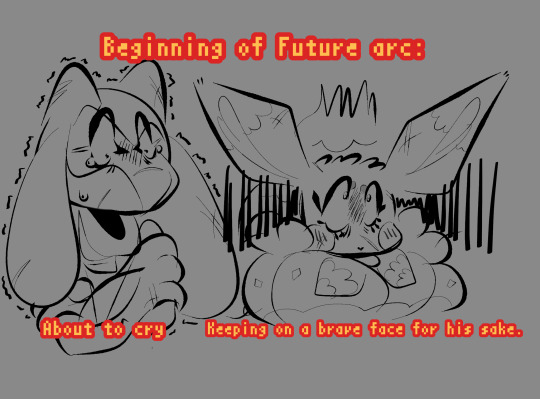
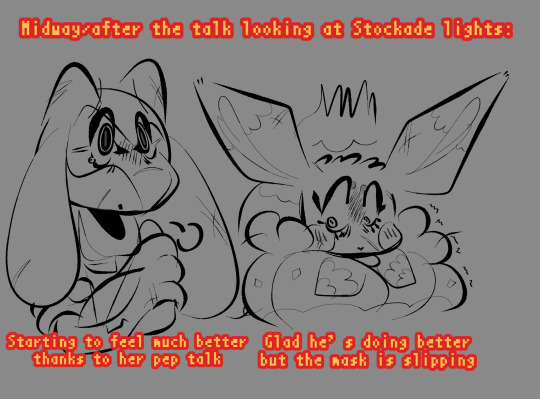
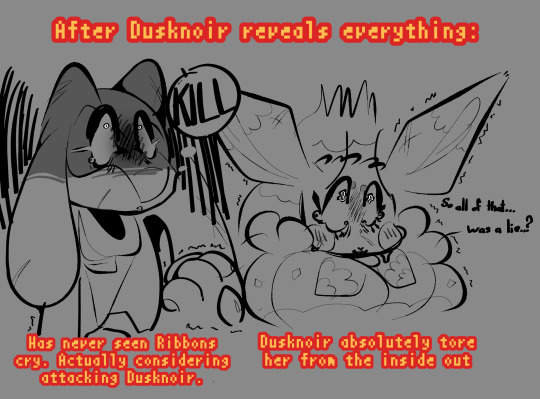
Thinking about a future arc pipeline with these two.
#pmd art tag#Eevee/Ribbons#Riolu/Aimilios#listeN.#I AM A SUCKER. FOR THE ‘CHAR A ENDS UP WHERE CHAR B STARTED. AND CHAR B ENDS UP WHERE CHAR A WAS’ TROPE#Also I feel like Hero was rlly only there to tell Partner ‘yeah we should believe Grovyle’ and ‘damn what a what plot twist’#I WANT RIBBONS TO GO THROUGH THE WRINGER OF EMOTIONS.#I WANT TO SEE. PARTNER SUPPORTING HERO. IN A BITTERSWEET CHANGE OF PACE OKAY.#I WANT TO SEE AIMILIOS COMFORTING HER (PUNCHING THE GROUND)
230 notes
·
View notes